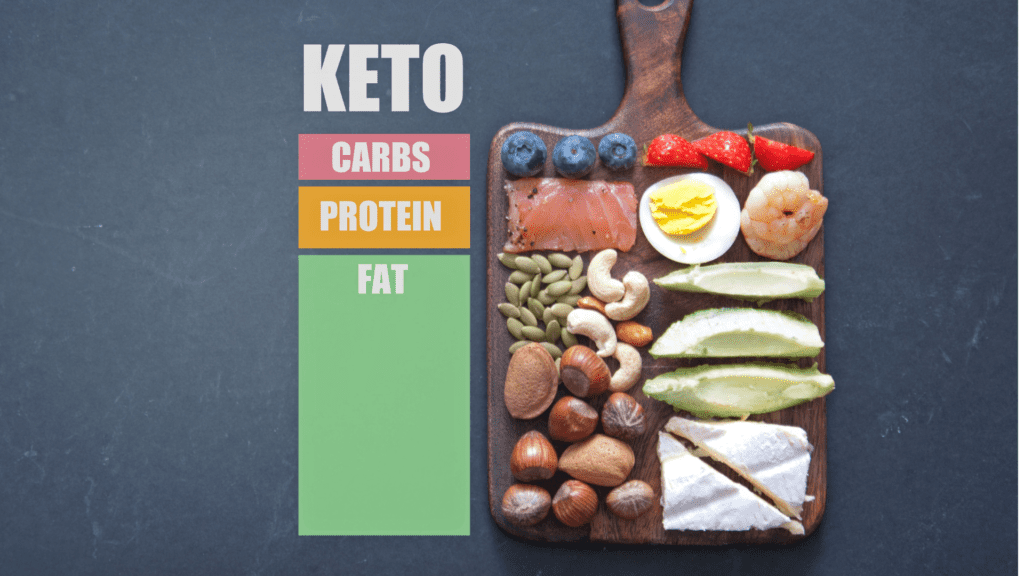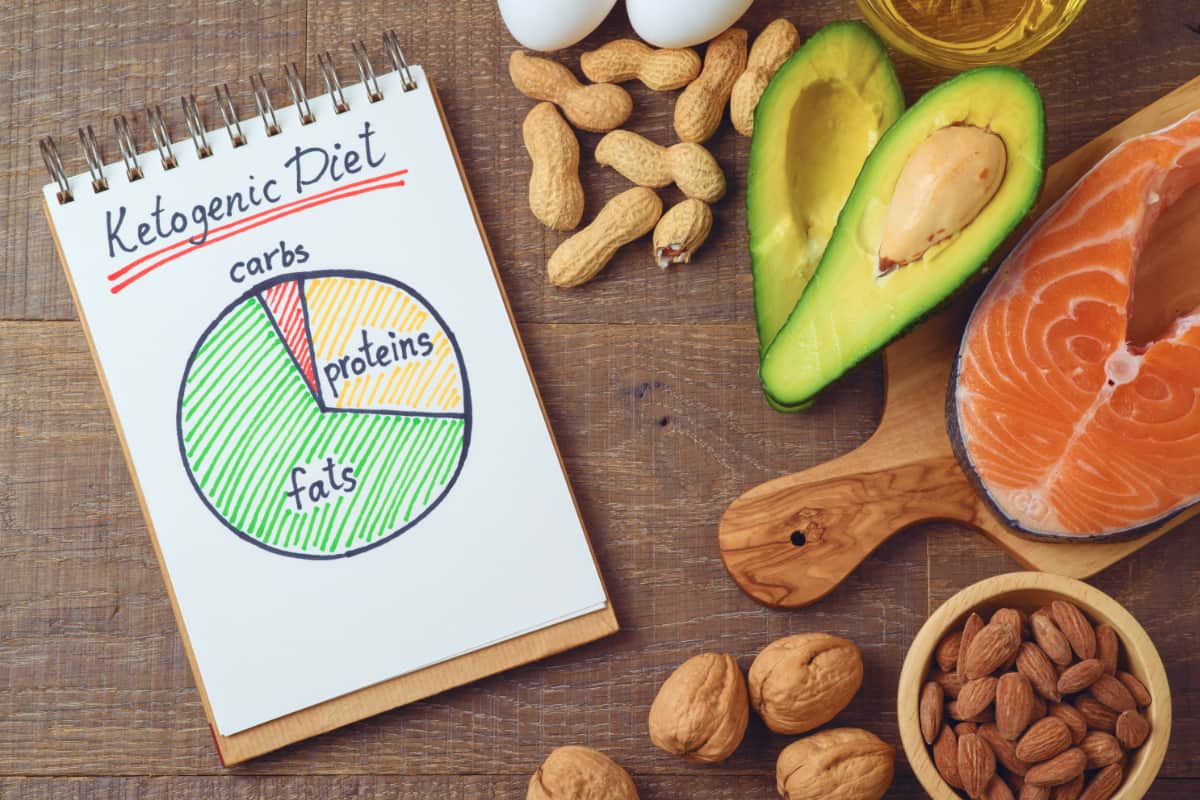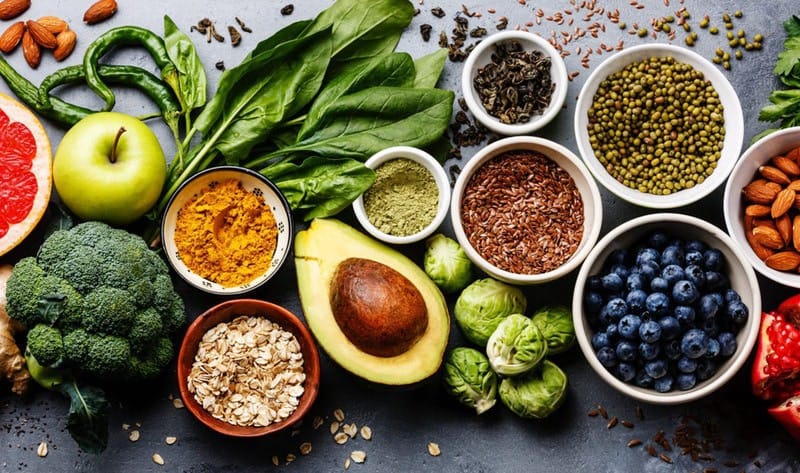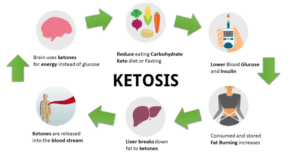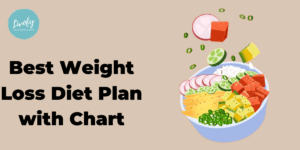While there are many myths about the Keto diet meaning, it is easy for individuals to question the effectiveness of the Ketogenic diet plan. However, if done with proper guidance, this can be one of the best ways to lose weight. Having said that, this diet comes with its own share of challenges and difficulties. Many of the keto diet success stories you read talk about the challenges they faced while following the Keto diet for beginners. Nonetheless, if done correctly, this diet has many health benefits. Here, we shall not only discuss what is keto diet but also how to follow the keto diet for beginners and some of its health benefits, in greater detail. Read on to know the complete guide to following a ketogenic diet plan and keto diet foods that you should consume.
What is a Ketogenic Diet?
Before understanding how this diet works, it is important to understand what is keto diet for beginners. A ketogenic diet is a low-carb, moderate protein and high-fat diet. Here, since the body doesn’t get enough carbohydrates, it uses the stored fat for energy, thereby helping to lose weight. Since there is a drastic reduction in carbs consumption, the body enters into a metabolic state called ‘Ketosis’. When your body enters the state of ketosis, it starts to burn fat quickly and efficiently. This diet not only helps with weight loss but also helps to control blood sugar levels. Hence, it can prove to be an effective way to not only lose weight but also manage your blood sugar spikes. For anyone thinking to follow this diet, one should know the keto diet foods that one should consume.
You can read more about it from our Keto diet blogs.
How Keto Diet Works?
Having understood the keto diet meaning and what is keto diet, let’s understand how it works.
When you eat less carbs every day, your body runs out of fuel. Hence, it starts to use protein and stored fat for energy. Being in this state where your body burns stored fats for energy is called ‘Ketosis’ which eventually stimulates weight loss. A keto diet plan is usually followed by people looking to lose weight or people looking to manage their chronic ailments like PCOS, Diabetes, Thyroid, Fatty Liver and Hypertension. It is extremely crucial to discuss your health condition with a healthcare provider before you start following the Keto diet.
Types of Ketogenic Diets
Following a Keto diet may be challenging for some since it requires you to cut down on your carbs consumption significantly. To be able to enter the state of Ketosis, one should consume less than 50 grams of carbs each day or even lesser, based on one’s body parameters and lifestyle. Here’s a general keto diet guide to know how much of protein, fats and carbs you should consume while on a keto diet.
| Fat | 70-80% |
| Protein | 10-20% |
| Carbohydrates | 5-10% |
Let’s now look at some of the different types of Keto diets to understand the Keto diet meaning better:-
Standard Ketogenic Diet (SKD):
The Standard Ketogenic diet is a high-fat, moderate-protein, and extremely low-carb diet. It normally has a 70–75% of fat content, 20% of protein content, and 5–10% of carbohydrate content.
In terms of grams per day, a typical ketogenic diet would include:
- 20–50 grams of carbohydrates
- 40 to 60 g of protein.
- There is no fixed limit for fat
For a diet to be considered a ketogenic diet, fat in the diet should make up for most of the calories. Hence, there is no cap on fat consumption because everyone’s needs for energy can differ greatly. Nonetheless, vegetables should play a significant role in ketogenic diets, especially non-starchy vegetables because they have a very low carbohydrate content.
Cyclical Ketogenic Diet (CKD)
Cyclical keto diet meaning entails following a Standard Ketogenic Diet plan 5–6 days per week, then indulging in higher carbs consumption for one–two days per week. Because they are designed to replenish your body’s depleted glucose reserves, these higher-carb days are frequently referred to as “refeeding days.” When you follow a cyclical ketogenic diet, you transition out of ketosis on refeed days so you can temporarily benefit from carbohydrate consumption. The cyclical ketogenic diet is popular among people looking to gain muscle and enhance exercise performance.
Targeted Ketogenic Diet (TKD)
A targeted Keto diet meaning entails increasing net carbohydrate intake to support high-intensity exercise performance without having to exit ketosis for extended periods of time. What this means is, that you’ll continue to follow a ketogenic diet as usual until 30-45 before workout. 30-45 minutes before a workout, you’d require to consume carbs. The plan is to consume just enough carbohydrates to power your workout and simply transition back into ketosis after you cool down. TKD can maintain high-intensity workout performance and aid recovery for the majority of people. The best people for it are high-intensity athletes, beginning or intermediate strength trainers, or people who cannot follow the cyclical keto diet.
High Protein Ketogenic Diet
This High Protein Keto diet meaning requires a slight increase in protein consumption. About 30% of calories should come from protein, while the remaining 65% should come from fat and 5% from carbohydrates. This is intended for people who require protein to help protect their muscle mass, such as bodybuilders and senior citizens who must prevent muscular deterioration. It’s also a smart choice for people who exhibit symptoms of protein insufficiency.
Health Benefits of Keto Diet
There are a number of health benefits and advantages associated with a Keto Diet. Let’s attempt to understand what is keto diet and how it helps you in ways more than one:
Weight Loss
As is obvious, a keto diet helps people to lose weight. Since the keto diet requires the body to enter into a state of ketosis where it starts burning stored fats for energy, it helps to lose weight and manage obesity. The Keto diet is considered to be one of the most effective ways to lose weight if done after proper consultation with a healthcare provider. The keto diet requires you to limit your carbs intake while increasing your fat and protein intake in the body. This enables the body to use fats instead of sugars for energy. Hence, one should be well informed about the keto food list before following this diet. It is highly recommended to consult a certified dietician or healthcare provider before following the keto diet plan.
Increase Concentration
It has been demonstrated that the keto diet can improve focus and cognitive performance. One reason of it could be the keto diet’s promotion of stable blood sugar levels. The body is forced to use fat for energy instead of glucose when very few carbohydrates are consumed, which can result in more stable blood sugar levels. You may be able to avoid energy crashes that can result in mental fog and concentration issues with this stable blood sugar level. The keto diet also promotes the creation of ketones, which can act as a different type of energy source for the brain. These ketones may aid in enhancing cognitive function and easing symptoms of brain fog. Thus, following a keto diet may help to increase focus and mental clarity.
Control Blood Sugar
It has been demonstrated that the low-carb, high-fat keto diet can help regulate blood sugar levels. Your body produces less insulin when you eat fewer carbohydrates. As a result, your risk of experiencing blood sugar spikes, which can cause sensations of exhaustion, hunger, and irritation, is reduced. The keto diet’s high fat intake might also make you feel fuller for longer after meals, which lowers your risk of nibbling on items high in carbohydrates that can raise your blood sugar. Studies have also demonstrated that adopting a ketogenic diet can help people with type 2 diabetes and other insulin resistance-related diseases better control their blood sugar levels.
Increased Energy
The keto diet may help with increasing energy levels in some people. When you adhere to the keto diet, you consume less carbohydrates and rely more on fat for energy. Because fat burns more slowly than glucose during the course of the day, this may result in a more stable energy supply. The keto diet can also prevent the energy slumps that often happen after eating meals high in carbohydrates. The keto diet may be a successful strategy for some people to enhance energy levels as it helps to stabilize blood sugar levels and encourages a more stable energy source. However, the keto diet may not be appropriate for everyone and may need to be carefully monitored and adjusted by a healthcare provider.
Appetite Control
It has been seen that the keto diet aids appetite control in a number of ways. The Keto diet’s high-fat content can make you feel fuller for longer after meals, which lowers your risk of overeating and snacking. Additionally, because fat takes longer to digest than carbohydrates, it remains in your stomach for a longer time and can keep you feeling fuller for longer. Moreover, the keto diet can make it simpler to adhere to a calorie-controlled eating plan and reach your weight loss objectives by lowering hunger and cravings.
Epilepsy
The Keto diet is especially helpful in reducing seizures in kids with difficult cases of epilepsy like Lennox-Gastaut syndrome and Dravet syndrome. The Keto diet works by encouraging the body to produce ketones, which are the byproducts of using fat for energy rather than glucose from carbohydrates. It has been demonstrated that ketones have an anticonvulsant effect, which can aid in lowering both the frequency and intensity of seizures. However, the keto diet should be under the supervision of a medical expert and can be followed combined with epilepsy medication.
Cholesterol & Blood Pressure
The Keto diet may help some to control cholesterol and blood pressure levels in the body. The Keto diet can help lower levels of LDL (“bad”) cholesterol and triglycerides while raising levels of HDL (“good”) cholesterol by encouraging the consumption of healthy fats and restricting the intake of carbs. As a result, there may be a lower risk of heart disease and stroke. Additionally, the ketogenic diet can lower blood pressure, especially in those who already have hypertension. The keto diet may accomplish this by aiding weight loss and lowering insulin resistance, as well as reducing oxidative stress and inflammation. The keto diet may not be appropriate for everyone, especially for people who have certain medical issues like pancreatic or liver illness. Hence, speaking to a health expert is essential before following the keto diet plan.
Insulin Resistance
The keto diet may be particularly helpful to improve insulin resistance. The keto diet can aid in improving insulin sensitivity and lowering blood sugar levels by restricting carbohydrate intake and encouraging the utilization of fat for energy. Your body turns the carbohydrates into glucose, which raises your insulin levels. However, because there are fewer carbohydrates to break down when you follow a keto diet, your body produces less insulin. This can assist in lowering insulin resistance and controlling blood sugar levels. In addition, the keto diet can lessen oxidative stress and inflammation, both of which can increase the risk of developing insulin resistance.
Ketogenic Diets for Diabetes and Prediabetes
What is keto diet for diabetics or prediabetics? Let’s understand:
Since the keto diet restricts the consumption of carbohydrates, it works particularly well for people with diabetes or prediabetes as it helps to regulate the blood sugar levels in the body. The insulin levels rise when we consume carbohydrates. However, while following the keto diet, we not only limit carb consumption but also increase the fat and protein consumption which helps the body enter into a state of ketosis, wherein the body uses fats instead of sugars for energy. This way, it helps to improve insulin sensitivity and prevent blood sugar spikes.
Things to keep in mind while following a keto diet for Diabetics and Prediabetics:
- Monitor your blood sugar levels regularly
- Choose healthy fats such as Avocados, nuts, seeds and olive oil
- Eat more nutrient-dense foods
- Drink plenty of water because the body will lose the water weight in the initial period of the keto diet
- Seek proper guidance from a healthcare expert.
Precautions Before Starting a Keto Diet
If you are planning to follow a keto diet, it is not only important to know what is keto diet but also take certain precautions:
- Educate yourself about the keto diet for beginners, different types of keto diet foods, keto food list etc.
- Take to a health expert to understand if your health condition and body parameters are appropriate for you to follow the keto diet
- Set and monitor your health goals to know where you’d want to reach and what progress you’ve made while on a keto diet
- Know what are the side effects of the keto diet and how to deal with them so that you are better prepared to handle the same.
- Take supplements, if necessary because the keto diet may cause certain nutrient deficiencies in the body, especially if you are a vegetarian. Hence, take supplements only if the keto diet foods aren’t able to help with nutrient deficiencies.
Some Best Keto Tips and Tricks
If you’d want to do the keto diet and reap maximum benefits, knowing what is keto diet and what are the best keto tips might prove to be helpful:
Prioritise Sleep
Keto insomnia is a common side effect of switching to a high-fat keto diet. It involves facing difficulty in falling or staying asleep. Hence, it is essential to prioritise your sleep and improve your sleep schedule. Keto insomnia is a common symptom, while on a keto diet. However, not all people following the keto diet experience it. Hence, if you are facing Keto insomnia while on a keto diet, there’s nothing to worry. Simply talk to your health expert and understand how to handle it better.
Decrease Stress
While you are on a keto diet, your body produces ketones that provide energy to the body. However, if you’re stressed, your body might limit the production of ketones as of result of increased levels on insulin. Hence, if you’d want to reap the maximum benefits of the keto diet and achieve your health goals, it is essential to decrease your stress levels.
Drink Plenty of Water
There are plenty of reasons why it is essential to consume a lot of water while following a keto diet. Firstly, a keto diet may result in diuresis, an increase in urine production that can cause dehydration. This happens as a result of the body burning stored glycogen. As a result, maintaining optimum hydration in the body by drinking enough water can help prevent dehydration. Second, the electrolyte balance in the body, including that of sodium, potassium, and magnesium, might be affected by the keto diet. These electrolytes must be balanced in order for the body’s cells to function properly, and water can help with that. Another benefit of drinking water is that it can improve digestion and lessen the symptoms of the keto flu, a typical side effect of switching to a keto diet.
Exercise Regularly
For a variety of reasons, regular exercise is crucial while following a ketogenic diet. Exercise, first and foremost, enhances overall body composition and aids in weight loss. Exercise can fasten the process of entering a state of ketosis, where the body burns fat for energy instead of glucose when combined with a low-carb, high-fat keto diet. Exercise also has the potential to enhance insulin sensitivity, which is crucial for controlling blood sugar levels and lowering the risk of type 2 diabetes. Through a decreased risk of heart disease and stroke, regular exercise can also help to improve cardiovascular health. Last but not least, research has proven that exercise is beneficial for mental health, lowering stress and anxiety and elevating mood.
What to Eat on a Keto Diet?
Now that you know what is keto diet, here’s a keto food list of the food items that you can eat while on a keto diet:
- Healthy fats such as Coconut oil, Butter, Ghee, Olive oil, Seeds, Nuts, Avocados etc
- Protein-rich sources of keto diet foods such as lean cuts of Meat and poultry, eggs, fish and the like
- Low carb vegetables such as leafy greens, cauliflower, broccoli, zucchini, and bell peppers.
- Dairy products such as Tofu, Paneer, Cheese, Butter, Ghee and the like
- Beverages like bulletproof coffee and green tea
You can also check out some of the Keto diet recipes to know what to eat while on the keto diet.
What Not to Eat on a Keto Diet?
Here are some foods that shouldn’t be part of your keto food list because they are not keto diet friendly:
- High-carb foods such as grains, bread, pasta, rice, potatoes and the like
- Sugary foods like candies, cakes, pastries, soda, jellies etc
- High carb fruits
- Sweetened or processed drinks such as canned fruit juices, sodas, and the like
- Processed or packed foods such as chips, crackers and the like
- High carb vegetables
Make sure to not count these foods as keto diet foods.
What to Drink on a Keto Diet?
While you’ve already looked at a keto food list, let’s now look at some of the drinks one can have while on a keto diet:
- Water
- Bulletproof coffee
- Unsweetened Green Tea
- Unsweetened Black tea
- Low-Carb Alcoholic Beverages
- Almond milk
- Coconut milk
- Bone Broth
You can also check out some of the keto-friendly beverages and keto-diet products.
What Not to Drink on a Keto Diet?
Here are some drinks that shouldn’t be part of your keto food list because they are not keto diet friendly:
- Soda and Sweetened Beverages
- Fruit juice
- Flavored milk and yogurt
- Sweetened Alcoholic Beverages
- Sweetened tea and coffee
- Any other high carb beverage
FAQs
Can I build muscle on a keto diet?
Yes, a ketogenic diet can help you gain muscle. Make sure you are getting enough protein and calories to support muscle growth if you want to gain muscle while following a keto diet. While the keto diet has a low carbohydrate content, it is crucial to have enough protein to maintain muscle growth and repair. One might need to take additional supplements for it if the keto diet foods don’t help with nutrient deficiencies caused by this diet.
What are the Cons of the Ketogenic Diet?
Here are some of the disadvantages of the ketogenic diet plan:-
- Initial side effects of the ketogenic diet such as Keto insomnia, headache, fatigue, nausea, and constipation
- Difficult to sustain in the long term
- The ketogenic diet may cause nutrient deficiencies and you may have to take additional supplements if the keto diet foods do not help curb these deficiencies.
- The ketogenic diet may not be suitable for everyone
- The ketogenic diet provides limited food options
Is it safe to follow the keto diet?
When properly followed, the ketogenic diet is generally regarded as safe for the majority of healthy adults. There are, however, potential side effects to any diet.
For instance, people with specific medical issues, such as liver or pancreatic disease, or those who are taking certain drugs, may not be ideal for the ketogenic diet. Initiating the ketogenic diet can also cause some people to have temporary side effects like headache, lethargy, and diarrhea, though these usually go away within a few days to a few weeks.
Hence, even though it is considered to be safe, it is essential to seek guidance from a heath expert and determine if it’s a safe choice for you.
How much protein should I eat on a ketogenic diet?
While the exact protein intake of an individual may depend on a number of their body parameters and medical history, it is believed that one should consume about 10-20% of protein while on e ketogenic diet.
Are there any risks of the keto diet?
Just like any other diet, there are some risks of the keto diet:-
- May lead to keto flu
- Eating excess high-fat animal foods might lead to kidney stones
- May cause digestive issues
- May lead to nutrient deficiencies
- Can lower blood sugar drastically, if not monitored properly.
While there are risks to following a ketogenic diet, one can overcome these with proper guidance from health experts.

